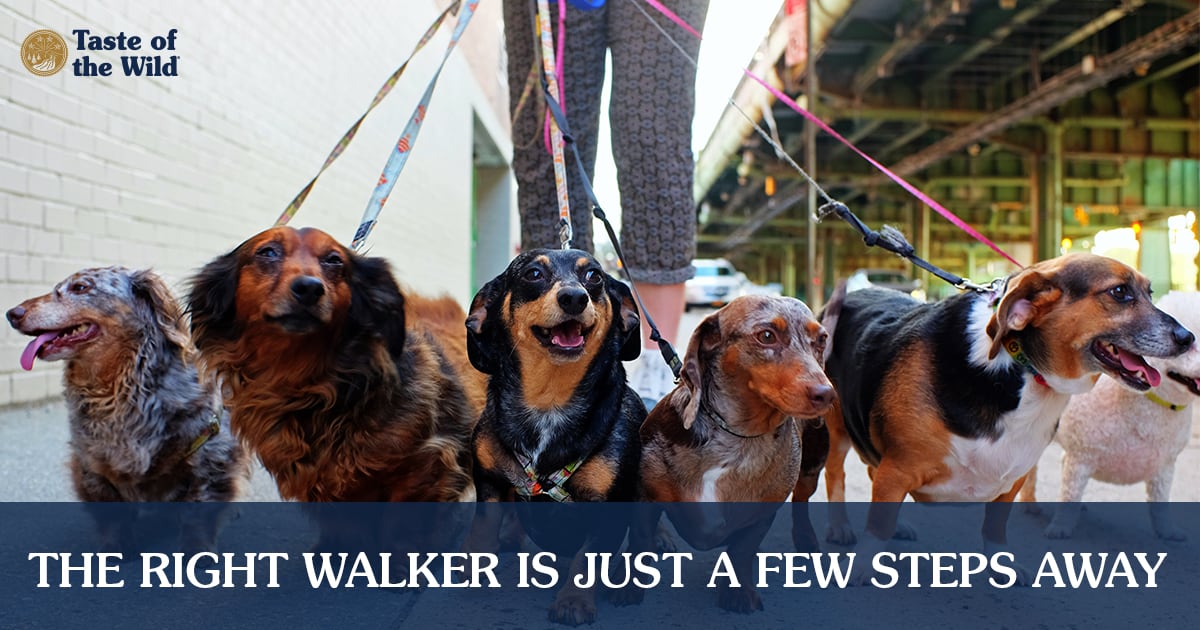
If daily walks are good for you, they’re perhaps even more important for your dog.
Besides being an opportunity to “take care of business,” walks stimulate your dog’s muscles and mind. They help work off excess energy, which is especially important for certain breeds (there is some truth to the adage “a tired dog is a well-behaved dog”). For puppies, walks support potty training and socialization. Walks also help overweight dogs shed extra pounds.
But with all you have going on in life, it can be easy for daily walks to fall through the cracks. That’s where a professional dog walker can help. As part of Walk Your Pet Month, we’re sharing tips on how to find the perfect walker for your pooch.
Determine your dog’s needs
Does your dog need the individual attention and bonding that can only occur with a solo dog walker? Or would he or she benefit from social walks with other dogs? How often and what distance does your dog need to be walked? What’s your budget?
Now ask for recommendations from friends, family and coworkers. Local veterinary offices and dog trainers are good sources, and you can also search the internet for local services.
What to ask dog walker candidates
Ideally, you’ll want to meet the potential dog walker and see how he or she interacts with your dog. Better yet, ask if they’d be willing to walk your dog while you talk. That way, you can gauge how your dog likes the walker and vice versa.
Start by being honest about any quirks your dog may have. Are they reactive with other dogs? Scared of loud noises? Will they take off if the leash is inadvertently dropped? Do they tend to pull on the leash? This will help the dog walker know how best to manage your dog.
While taking a stroll, you might ask:
- What kind of training and experience do you have? The best dog walkers have more to say than “I love dogs.” Hopefully, they’ve had previous dog walking experience or a background in dog training or perhaps they work at a shelter or veterinary clinic, so they can read dog language and are comfortable handling dogs in a positive way.
- Do you have references I can contact? Consulting people who have previous experience with that dog walker can provide reassurance that the person is reliable, trustworthy and good with dogs.
- Where would you take my dog on a walk? Will your dog be walked on city streets or in a park? Will the dog be off leash at any point? What distance do you plan to cover during each walk? Is there a window of time when you can expect them to pick up your dog?
- Do you use a car or van to transport the dog? If so, how often is the vehicle cleaned and what safety measures are used to restrain dogs while it is moving?
- Do you have liability insurance? The larger dog walking companies are more likely to have insurance, but it’s important to find out what, exactly, it covers. Does it include emergency veterinary services? Where would they typically take the dog in an emergency?
- Do you provide daily reports? You want to be reassured that your dog walker shows up and actually walks your dog. Of course, there are GPS dog collars that enable you to track your dog’s movements. But a responsible dog walker will give you a daily “poop and pee” report, and include observations such as whether your dog is limping, scratching or displaying behavioral issues.
- If there will be multiple dogs on the same walk, what health precautions are taken? To help protect your dog’s health, all owners should be required to present proof that their dogs are current on vaccinations and parasite preventives.
- What is your payment schedule and cancellation policy? What are the daily or weekly rates and what forms of payment do they accept? What if you need to cancel? Make sure this is all in writing.
With the right dog walker, you can feel confident that you’re doing your best to keep your dog mentally and physically healthy.
The information in this blog has been developed with our veterinarian and is designed to help educate pet parents. If you have questions or concerns about your pet's health or nutrition, please talk with your veterinarian.
